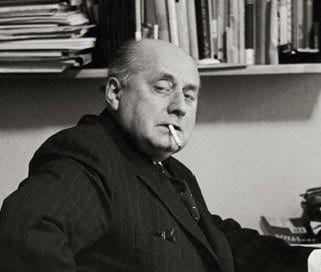Since all of my paternal ancestors for centuries have been Lutheran clergymen, the religious element permeated my youth almost exclusively. My father, now retired, was an unusual man: orthodox, perhaps not in a dogmatic sense, but as a personality; heroic in his teaching, heroic like an old testament prophet, of great individual power like the Pastor Sang in the play of Björnson that they used to stage when I was young: Beyond Human Power.
As assuredly as I distanced myself early on from the questions of dogma, from the teaching of the community of faith, in order to turn to the questions of expression, of the word, of the poetic, as assuredly have I never forgotten the atmosphere of my father's house: expressed in the fanaticism towards transcendence, in the persistence to declare any sort of materialism, be it historical or psychological in kind, as unfit for the observation and representation of life. But I see transcendence turned towards the artistic, as the philosophy, the metaphysics of art. I see art taking the rank of religion, replacing it. Within the great European nihilism, within the nihilism of all values, I see no other transcendence but the transcendence of creative joy.
Whether the church will gain back its ability to move human being towards a greater spiritual unfolding instead of constricting it, making it austere and intolerable, I do not see. I rather see that the gods perish at the hands of religion, while socialism hardly is able to dry all tears—and that only art remains as the true task of life, as the ideality, the metaphysical activity to which we are bound by duty.
1931
t. Unsinn


